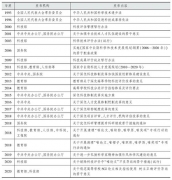职场英语:职场36计 老板让你背黑锅如何破?
来源:发布时间:2015-04-09 14:08
[摘要]功劳都是老板的,错误都是下属的!遇到这样喜欢让人背黑锅的老板,怎么办?是逆来顺受还是越级报告把问题澄清?如果你也遇到了这种情况先别下结论,跟老板好好谈谈,或许还有更合适的解决办法!

In too many workplaces, when something goes wrong, people waste far more time and energy assigning blame for it than trying to find a solution," observes Ben Dattner, adding that the recession exacerbated the problem, so that finger-pointing is now more widespread than ever.
本-达特纳发现:“在职场上,一旦某件事出了差错,人们会把更多的精力用于相互指责,而不是努力找出解决方案,这样的情况太常见了。”他补充道,经济衰退加剧了这个问题,所以现在转嫁责任的做法比以前更要普遍。
An organizational psychologist and consultant, Dattner wrote a book called The Blame Game: How the Hidden Rules of Credit and Blame Determine Our Success or Failure. You don't mention whether you've ever talked with your boss about his habit of throwing you under the bus but, if not, it's time to start. "Confronting him is risky, but saying nothing and letting this go on is risky too," Dattner notes.
达特纳是一位组织心理学家和顾问,曾写过一本书,名为《责备游戏:荣誉潜规则和责备如何决定我们的成败》。关于你的上司经常把你推下火坑这件事,不知道你是否与他交流过,如果还没有,现在是时候了。达特纳表示:“直接与他对质会有风险,但沉默和逆来顺受同样有风险。”
The key is in how you approach the conversation. Dattner suggests asking lots of questions about exactly why your boss believes a mistake was someone else's fault. Pinning him down on the details -- in a calm, non-accusatory way, of course -- will put him on notice that you're tired of being a scapegoat and you want to prevent it in the future. You may also learn something useful about how he perceives your role, and his own.
关键是如何发起对话。达特纳建议,问一些具体的问题,比如你的上司为什么认为错误是别人造成的。跟他讨论出问题的细节,以此迫使他停止诬陷——当然要以平静、而不是责难的方式。这会让他意识到,你已经受够了继续做他的替罪羊,你希望在未来阻止这样的事情再次发生。你还可能了解到一些有用的东西,比如他如何看待你的角色和他的职责。
"Try to get to the bottom of what's really going on here," Dattner advises. Is it possible, for instance, that who was accountable for which parts of a given project wasn't clear at the outset, so your boss genuinely believes you or a teammate dropped the ball? "The biggest mistake I've seen people make is reacting to a situation, usually angrily, without really understanding it first."
达特纳说:“尽量弄清楚事情的真相。”比如,有没有可能是因为在最开始,大家并没有明确谁应该负责某个项目的哪个部分,所以你的上司真的以为是你和你的同事犯了错误?“我遇到过人们犯的最大的错误,是非常愤怒地对这种情况做出反应,而并没有首先了解事实的真相。”
Robert Hosking, executive director of staffing company OfficeTeam, agrees. "You need to know exactly how the blame for a problem got assigned to you," he says. "Then steer the discussion toward how to prevent the same thing from happening again."
员工安置公司OfficeTeam执行董事罗伯特-霍斯金同意达特纳的观点。他说:“必须弄清楚,到底是什么使你因为某个问题而受到责备。之后再去讨论如何防止同样的事情再次发生。”
One way to head off future finger-pointing, Hosking says, is to start documenting everything you and your teammates do. "Often everyone is so busy that things get overlooked or slip through the cracks," he says. "So begin each project with a written outline of who is responsible for what, and make sure everyone, including the boss, has a copy and signs off on it." Detailed accountability might even prevent mistakes from happening in the first place.
霍斯金表示,防止未来被嫁祸的一种方法是,开始记录你和同事做的每一件事。他说:“通常情况下,人们太忙了,忽视、错过了许多事情。所以在每一个项目开始之前,用书面方式列出每个人的职责,同时确保所有人,包括上司本人在内,人手一份,并在上面签字。”详细的责任分配甚至可以防止错误的发生。
As you already suspect, going over your boss's head to complain is so likely to backfire that it has to be a last resort. "If you're being unfairly accused of something that could seriously damage your career, do take it upstairs, and think about involving someone from human resources as well," Hosking says. "But warn your boss first, so he's not blindsided. Invite him to sit in on the meeting. Frame it as a chance to clear the air."
正如你所怀疑的,越过自己的上司提出投诉,可能会适得其反,所以这只能作为最后的手段。霍斯金说:“如果你因为某件事受到不公平的指责,而这件事会严重损害你的职业发展,这时候可以考虑向更高层投诉,并可考虑由人力资源部出面解决。但首先要警告你的上司,以免他会措手不及。邀请他参加会议。把这作为消除误会,澄清事实的一次机会。”
Small consolation though it might be, Hosking points out that the people your boss reports to are probably already aware that something's amiss. "If this manager has shown a pattern over time of never accepting responsibility for problems, higher-ups are going to notice that," he says. "Don't assume they're oblivious. Eventually, someone will call him on it."
虽然这么说只能作为一个小小的安慰,但霍斯金指出,你上司的上级或许早已察觉到事情不正常。他说:“如果你的上司表现出从来不肯承担责任的态度,高层肯定会注意到这一点。不要假设他们对此并不在意。最终,肯定会有人找他清算的。”
In the meantime, Ben Dattner has one additional suggestion for you: Concentrate on building a strong network. "A boss who denies you credit and unfairly blames you may change [his] tune when he realizes that others, both inside and outside the organization, recognize your talent," he writes in The Blame Game.
此外,本-达特纳还有另外一条建议:集中精力建立一个强有力的人际关系网络。他在《责备游戏》中写道:“如果你的上司否认你的功劳,还对你横加指责,等他意识到公司内外都认可你的才能时,他或许会改变自己的态度。”
A robust network of fans can make you more likely to be offered other jobs, inside and outside the company, Dattner notes, and "even the most credit-hogging and blame-dumping boss will not want to be viewed as out of step with others in the organization, or to be blamed for being the reason why a talented, hard-to-replace employee left."
达特纳表示,强有力的粉丝网络让你更有可能从内部和外部获得其他工作机会,即便是“最贪图功劳和热衷嫁祸他人的上司,也不希望自己被认为与公司其他人步调不一致,也不希望因为一位优秀的、难以替代的员工离职而受到指责。”
Once it's in your boss's own best interest to stop scapegoating you, in other words, he probably will.
一旦停止拿你当替罪羊成为对你上司最有好处的事情,他自然就会改变之前的做法。
[发布者:yezi]
-
精彩推荐
- 金平果RCCSE《中国学术期刊评价研究报告》(第六版)新鲜出炉
- 2020-2021年中国研究生教育高校竞争力排行榜(500强)
- 机械硕士研究生学科(专硕)排名_金平果2020-2021年高校研究生教育分学科(专硕)排行榜
- 材料学专业排名_评价网2020-2021年高校研究生教育分专业排行榜
- 金平果2020-2021年教育学学科排名——高校研究生教育分一级学科排行榜
- 新鲜出炉!后“SCI至上”背景下我国第一个研究生教育排行榜
- 捐资700万!邱均平颜金莲教育基金重奖涟源四中优秀学子
- 发挥第三方评价优势 助力科研评价改革
- 第四届全国“双一流”建设与评价论坛 延期举办的通知
- 杭电举行邱均平颜金莲教育发展基金捐赠签约仪式
-
最近更新
- 《EVALUATION & MANAGEMENT》(Quarterly)2020 Issue 5
- 教育部启动实施新一轮本科教育教学审核评估|内附实施方案全文
- 回首2020,展望2021,我国高等教育评估政策大盘点!
- 特别报道|邱均平:新时代我国科研评价体系重构中必须处理好八大关系
- “金平果”首次发布职业本科院校综合竞争力排行榜
- 新工科研讨(七):佐治亚理工学院开展研究生就读体验调查
- 新工科研讨(六):佐治亚理工学院工程学院的“重大挑战”学术项目概况
- 新工科研讨(五):佐治亚理工学院设置研究生工程创业项目
- 新工科研讨:麻省理工学院设置研究生跨学科工程学位(四)
- “金平果”公布2021年加拿大大学留学排名
-
图片新闻






